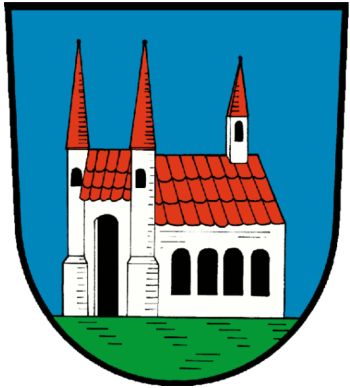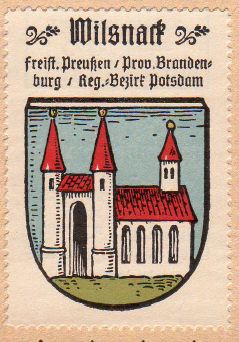Bad Wilsnack: Difference between revisions
Knorrepoes (talk | contribs) m (Text replacement - "{{de1}}↵" to "") |
Knorrepoes (talk | contribs) m (Text replacement - "{{media}}" to " {{de1}} {{media1}}") |
||
| Line 33: | Line 33: | ||
{{ | |||
{{de1}} | |||
{{media1}} | |||
[[Civic Heraldry Literature - Germany|'''Literature''']]: [[Otto Hupp|Hupp]] 1896, 1898; Bensing et al., 1984 | [[Civic Heraldry Literature - Germany|'''Literature''']]: [[Otto Hupp|Hupp]] 1896, 1898; Bensing et al., 1984 | ||
Revision as of 12:37, 26 December 2022
This page is part of the German heraldry portal |
Heraldry of the World |
|
German heraldry:
|
Selected collector's items from Germany:
|
BAD WILSNACK
State : Brandenburg
District (Kreis) : Prignitz
Additions : 1974 Groß Lüben, Klein Lüben; 2001 Grube
Amt : Amt Bad Wilsnack/Weisen
| German |
In Blau auf grünem Boden eine silberne Kirche mit rot-geschindeltem Dach und Dachreiter, schwarzer Tür, schwarzen Fenstern und einem Rundturm beiderseits des Portals; die Türme haben schwarz-beknaufte rote Spitzdächer. |
| English | Wilsnack No blazon/translation known. Please click here to send your (heraldic !) blazon or translation |
Origin/meaning
The arms were officially granted on January 8, 1992.
The arms are first appeared on the local seal from 1586 and show the local church devoted to St. Nicholas. The church was an important church which attracted many pilgrims in medieval times until the 16th century. After a fire in the church in 1383 three non burned hosts were found, all three also had a drop of blood, which was considered a miracle and many people flooded to the city to see the holy blood. The three hosts were burned (...) by the first Lutheran priest after the Reformation.
The arms have not been changed since.
| The arms by Hupp in the Kaffee Hag albums +/- 1925 |
Literature: Hupp 1896, 1898; Bensing et al., 1984



